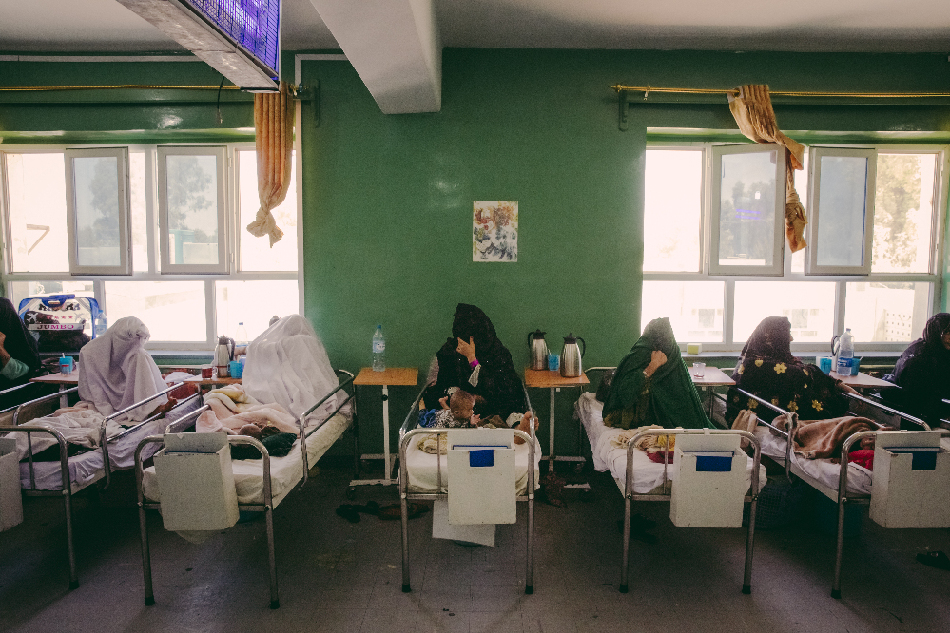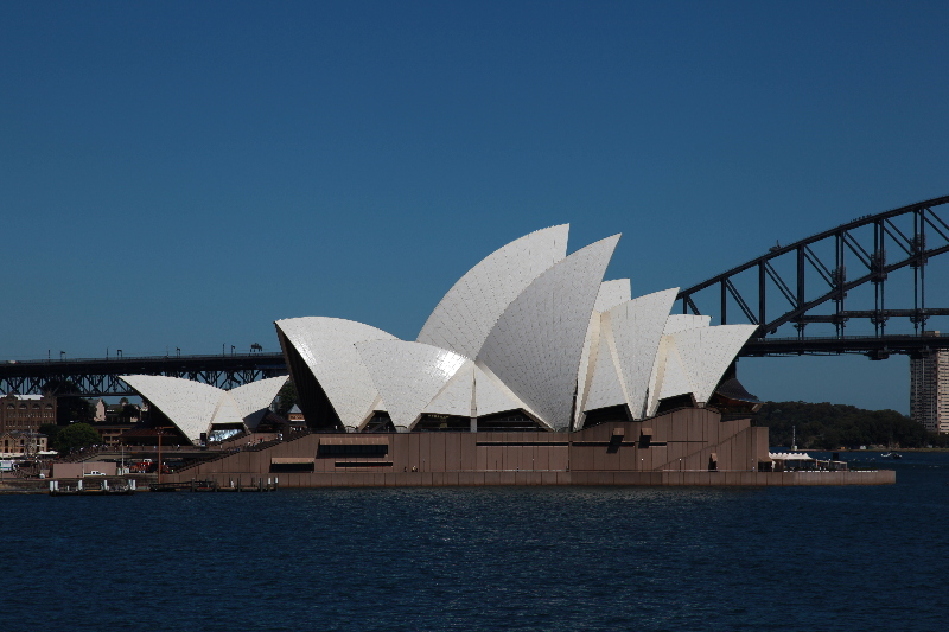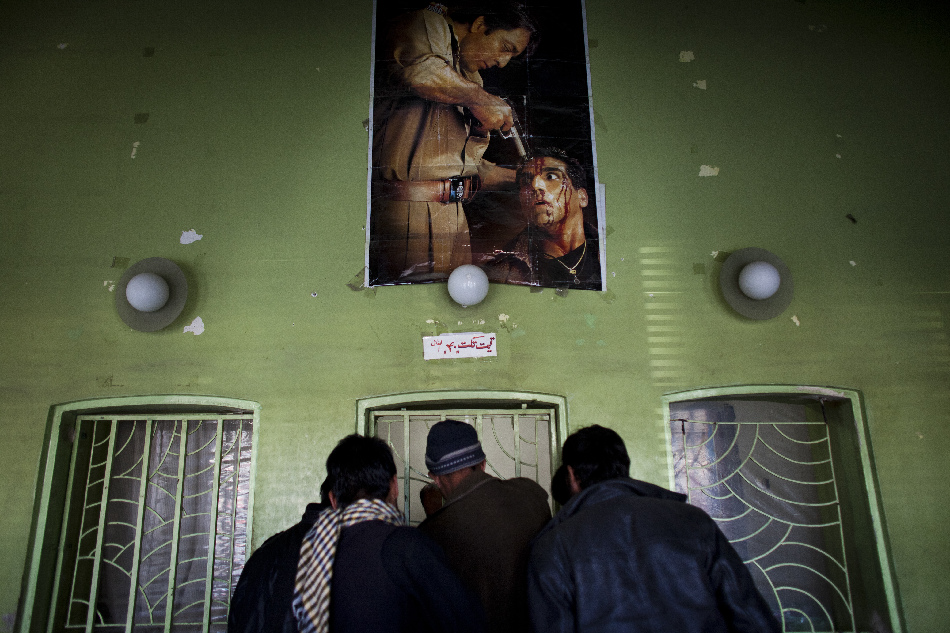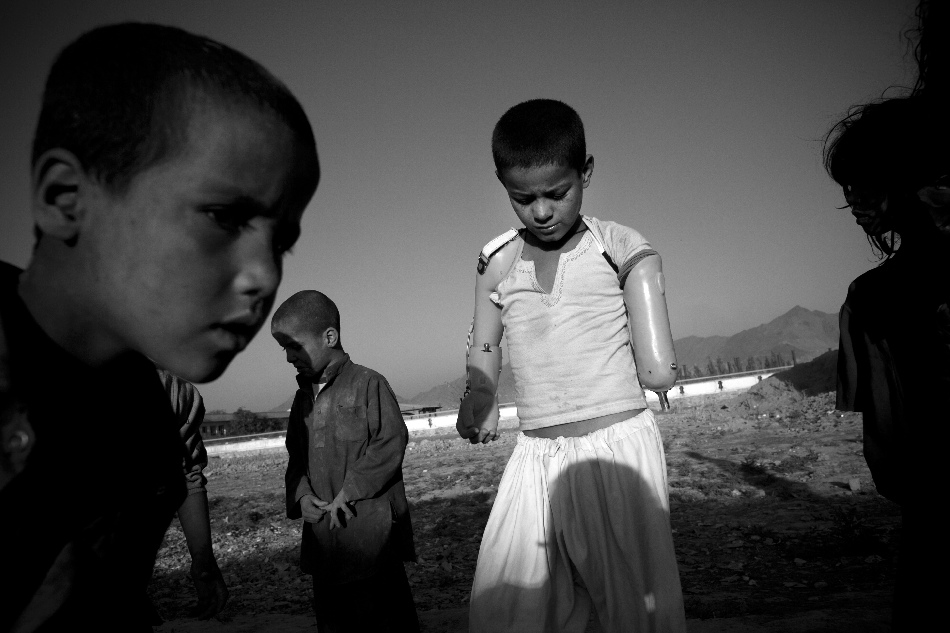Confusion About The Rage of Australia Over Chinese official's Tweet
A computer-generated picture posted by Chinese Foreign Ministry Spokesperson Zhao Lijian ignited the rages of Australian Prime Minister Scott Morrison.
What the picture depicted was an Australian soldier posing to slit the throat of a young Afghan boy. It referred to the bloody killing of 39 unarmed prisoners and civilians in 2009-13. Nineteen current or former members of the Australian special forces in service in Afghanistan have allegedly committed the crime. These awful revelations were made by the Australian military's own investigations.

Malnourished Afghan children sat with their mothers as they received medical care in the ITFC (Inpatient Therapeutic Feeding Centre) ward at the Bost Hospital, a Medecins Sans Frontiers (MSF) assisted hospital, on September 24, 2013 in Lashkar Gah, in Helmand Province, Afghanistan.(photo by Daniel Berehulak/provided to Guangming Picture)
Here are confusing facts showing a contradictory Australia throughout the whole thing.
DELICATE LINE
Faced with the graphic, Scott Morrison first condemned the post as "repugnant" and demanded an apology from the Chinese side.
Last Thursday, the angry Prime Minister struck a much more conciliatory tone at a news conference, describing the China-Australia relationship as a "mutually beneficial one" and called for a reset and dialogue with China.
Australia is walking a delicate line between setting diplomatic fire to China and maintaining a close trade relationship.
On the one hand, the country can always be found at the front of standing up to China:
In 1995, Australian media revealed a highly sophisticated joint US-Australian operation to bug the newly constructed Chinese Embassy in Canberra, which forced the government to renovate it.
In 2017, Australia passed foreign interference laws to ban all foreign donations to political campaigns, aiming at curbing so-called Chinese influence.
In 2018, Australia became the first country to block Chinese Huawei's 5G technologies.
At the beginning of this year, Australia was one of the most vocal and early advocates of international inquiry into the source of the coronavirus and China's handling of the pandemic.
In July, Australia abandoned its neutrality on the South China Sea issues and rejected the legal basis of China's maritime claims.
The laws passed by Australian Parliament this Tuesday enable Canberra to block or curtail foreign involvement in sectors such as infrastructure, tourism, science and education. It is interpreted as a move targeting the agreement signed by the Victoria state government to join China's BRI.

Photo shows Sydney Opera House in Sydney, Australia. (photo by Chen Zhan/Guangming Picture)
On the other hand, closer trade relations with China are always desirable for Canberra.
In 2018, trade between the two countries was valued at $158 billion.
In 2019, exports of services and goods, one third of which flooded into China, made up 22% of Australia's GDP of the whole year.
The ongoing trade friction with its number one trading partner will definitely cast a shadow on Australian economy, despite rebound in the third quarter this year compared to the prior one.
Should nearly all trade between the two be shut down, that would cost Australia some 6% of GDP, according to researchers at the University of Western Australia and Australian National University.
LEAKER OR WHISTLEBLOWER

People bought movie tickets at ticket office at the entrance to Ariana Cinema in Kabul, Afghanistan Dec. 1, 2010.(photo by Jonathan Saruk/provided to GuangmingPicture)
Being treated like a "traitor to the diggers" for years during the deployment in Afghanistan, David McBride, the whistleblower, now is confronted with a worse situation.
From 2014 to 2016, McBride compiled evidence on alleged war crimes committed by Australian soldiers and leaked the documents to the media, which was then made public in 2017.
It is said that McBride tried to tempt the Australian Federal Police, but no one bit.
What McBride gathered turned out to be credible proof of the war crimes. Instead of awards, McBride was faced with accusation of five national security-related offences, including theft of Commonwealth property and unlawfully disclosing a Commonwealth document, which carry a mandatory life sentence.
There are growing calls for dropping all charges against David McBride. Doing so would "support future whistleblowers", said Nadir Azami, president of the Afghan Community Support Organization of New South Wales.
Despite the public's strong demand for freeing McBride, Attorney-General Christian Porter has given a disturbing hint. "Intervening in the McBride case is utterly extraordinary and would necessarily, by its very nature, represent political intervention in a process which has conventionally been independent."
WRONG TARGET
"The report sent shock waves through the Australian public, but it didn't dominate global news." It was not until words of war on Zhao's tweet drove global attention that the Australian government was forced "to respond and launch the story into the global headlines," a Vox News article said.
"How many people knew about the report before?" Bonnie Glaser, director of the China Power Project at the Center for Strategic and International Studies, said on CNN. She echoed that, the very existence of the image focused the whole world on the human rights violations.
Take a closer look at the matter itself. The logic behind such spats about human rights is so weird. It's quite normal for others to criticize China's so called "human rights violations" in Xinjiang and Tibet without even setting foot in the places and looking for the truth with their own eyes. But China is not allowed to say out loud the brutal reality of proven crimes.
Though confusing, this kind of "I can, but you are not allowed" mentality is obvious. "I can have the 5G, but you are not allowed", "I can take you down economically, but you are not allowed" to counter-act and "I can openly criticize you, but you are not allowed" to do the same.
Even worse, Australia is now firing at a wrong target. A spat between China and Australia does no good to either side, especially when Afghanistan, the whistleblower, the Australian who want to safeguard the honor of the troops by correcting the misconduct, and the whole world caring about human rights are all waiting for a judicatory follow-up.

Children are the victims of wars in Afghanistan. Eight-year-old Akram is a case in point. The conflict forced his whole family to leave Jalal Abad and migrated to Pakistan in Pishawa. Forced to live like beggars, Akram was struck by a high-voltage electricity current while foraging through rubbish. His hand dried up from the shock and had to be amputated.(photo by Majid Saeed/provided to Guangming Picture)
"It needs the true acts of prosecution of those committed such crimes for sake of justice," said the local newspaper Afghanistan Times. "We also welcome other countries'standpoint to bring the killers of innocent Afghans to justice."
[ Editor: WXL ]




More From Guangming Online
Medics from Fujian leave for Shanghai to aid in battle against COVID-19 resurgence
New int'l land-sea transport service to Indo-China Peninsula launched
Another makeshift hospital under construction in Shanghai
Tourists view tulips in Suiping County, Henan
In pics: blooming gagea flowers on grassland in Zhaosu, Xinjiang
Greek workers stage 24-hour general strike over high prices